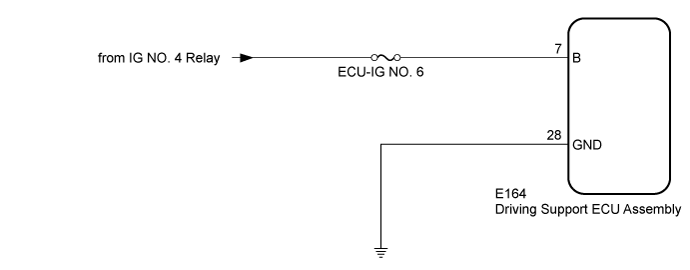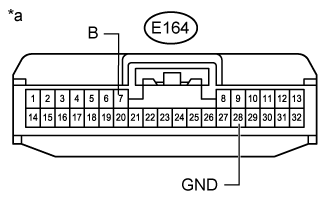Pre-Crash Safety System Pre-Crash Safety System Circuit
DESCRIPTION
WIRING DIAGRAM
INSPECTION PROCEDURE
CUSTOMER PROBLEM ANALYSIS AND SYMPTOM CHECK
INSPECT BATTERY
CHECK HARNESS OR CONNECTOR (DRIVING SUPPORT ECU ASSEMBLY - BATTERY AND BODY GROUND)
CHECK CAN COMMUNICATION SYSTEM
CHECK DTC OUTPUT
DATA LIST / ACTIVE TEST
VEHICLE CONTROL HISTORY
PRE-CRASH SAFETY SYSTEM - Pre-crash Safety System Circuit |
DESCRIPTION
This circuit supplies power to the driving support ECU assembly when the engine switch is on (IG).
WIRING DIAGRAM
INSPECTION PROCEDURE
- NOTICE:
- Inspect the fuses for circuits related to this system before performing the following inspection procedure.
| 1.CUSTOMER PROBLEM ANALYSIS AND SYMPTOM CHECK |
Check the customer problem analysis and symptom (Click here).
Measure the battery voltage.
- Standard voltage:
- 11 to 14 V
Using the parts location and system diagram, check the system for blown-out fuses, open or short circuits in the wire harness(es) and connectors that are not properly connected by performing a visual check.
- HINT:
- If the voltage is 11 V or less, replace or recharge the battery before proceeding to the next step.
| 3.CHECK HARNESS OR CONNECTOR (DRIVING SUPPORT ECU ASSEMBLY - BATTERY AND BODY GROUND) |
- NOTICE:
- As the connector may be damaged if a load of more than 10 kg (22 lb) is applied to it, do not apply any more load than necessary to the connector.
Disconnect the driving support ECU assembly connector.
Measure the voltage according to the value(s) in the table below.
- NOTICE:
- DTCs may be output when connectors are disconnected during inspection. Therefore, make sure to clear the DTCs using the GTS once the inspection has been completed.
- Standard Voltage:
Tester Connection
| Condition
| Specified Condition
|
E164-7 (B) - Body ground
| Engine switch on (IG)
| 11 to 14 V
|
Engine switch off
| Below 1 V
|
Measure the resistance according to the value(s) in the table below.
- Standard Resistance:
Tester Connection
| Condition
| Specified Condition
|
E164-28 (GND) - Body ground
| Always
| Below 1 Ω
|
Text in Illustration*a
| Front view of wire harness connector
(to driving support ECU assembly)
|
| | REPAIR OR REPLACE HARNESS OR CONNECTOR |
|
|
| 4.CHECK CAN COMMUNICATION SYSTEM |
Use the GTS to check if the CAN communication system is functioning normally.
- for LHD: Click here
- for RHD: Click here
ResultResult
| Proceed to
|
CAN communication system DTCs are not output
| A
|
CAN communication system DTCs are output (for LHD (w/ Central Gateway ECU))
| B
|
CAN communication system DTCs are output (for RHD (w/ Central Gateway ECU))
| C
|
Connect the GTS to the DLC3.
Turn the engine switch on (IG).
Enter the following menus: Body Electrical / Pre-Crash 2 / Trouble Codes.
Check the DTCs (Click here).
Clear for DTCs (Click here).
Recheck for DTCs. Try to reproduce the DTCs by duplicating the conditions indicated by the DTCs. (Click here).
ResultResult
| Proceed to
|
DTCs are not output
| A
|
DTCs are output
| B
|
| | GO TO DIAGNOSTIC TROUBLE CODE CHART |
|
|
| 6.DATA LIST / ACTIVE TEST |
Using the GTS, check the Data List (Click here).
Using the GTS, perform the Active Test (Click here).
| 7.VEHICLE CONTROL HISTORY |
Check whether the vehicle control history (PCS operation history) matches the customer analysis (Click here).
ResultResult
| Proceed to
|
Vehicle control history matches the customer analysis
| A
|
Vehicle control history does not match customer analysis or there is no vehicle control history
| B
|
| | USE SIMULATION METHOD TO CHECK |
|
|

